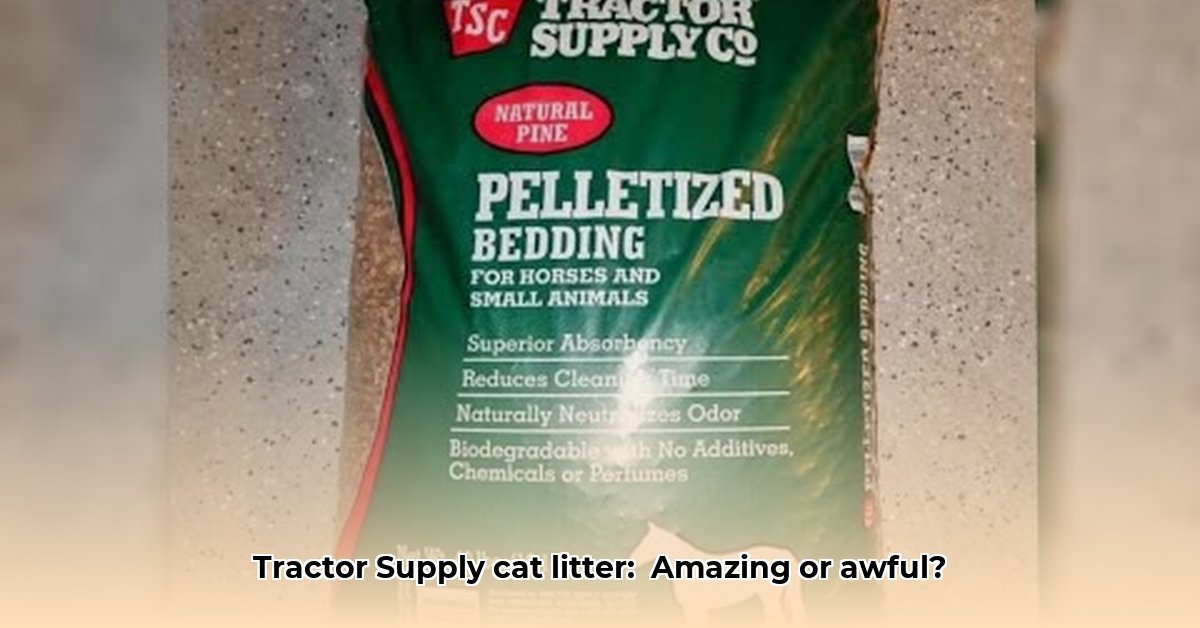
Cost: Saving Money on Kitty Litter?
Traditional clay cat litters can be expensive, often costing between $0.50 and over $1.00 per pound. Tractor Supply's wood pellets, however, are significantly cheaper, averaging around $0.19 per pound. This represents substantial potential savings annually. However, the lower cost per pound might be offset by higher usage; you may need to use more pellets to achieve the same level of cleanliness as with traditional litter. A direct cost comparison, factoring in usage rates, is crucial before concluding on overall cost-effectiveness. Is the initial lower price per pound truly indicative of long-term savings? For more on Tractor Supply products, check out their website.
Absorption: How Effective Is It?
The manufacturer claims the pellets absorb five times their weight in liquid. While some users report excellent absorption, others find the performance falls short of this claim. Independent verification of absorbency through rigorous testing is necessary to validate these contrasting experiences. Superior absorption translates to less frequent litter box cleaning, a significant advantage for busy pet owners. Conversely, inadequate absorption necessitates more frequent scooping which reduces convenience. How crucial is superior absorption to your needs?
Environmental Impact: A Greener Option?
The biodegradability and compostability of these pellets are significant selling points, potentially reducing landfill waste. However, their environmental friendliness depends critically on two factors: sustainable sourcing of the wood and proper composting by the consumer. The current information available provides insufficient detail to definitively assess the sustainability of the wood source. Furthermore, improper composting negates the environmental benefits. Are the benefits truly environmentally friendly under a proper lifecycle analysis?
Safety: Are They Safe for Cats?
A critical concern centers on potential health risks. Phenols, toxic to cats, must be removed through kiln-drying. While Tractor Supply claims their pellets undergo this process, this is not explicitly stated on the packaging, raising concerns about transparency. Clear labeling of processing information is crucial for responsible pet ownership. The lack of readily available information about phenol levels leaves pet owners responsible for weighing potential health risks. Independent testing to verify the absence of harmful phenols would significantly alleviate these safety concerns. What level of safety are you willing to accept?
Stakeholder Impact: Who Benefits?
The impact of Tractor Supply wood pellets varies among different stakeholders:
| Stakeholder | Benefits | Drawbacks |
|---|---|---|
| Cat Owners | Lower cost, potentially less landfill waste. | Potential health risks, may require more frequent scooping. |
| Tractor Supply | Increased sales, potential for a new market. | Potential negative publicity if sourcing/safety concerns arise. |
| Environmental Groups | Decreased landfill waste (if sustainably sourced) | Concerns about sustainable sourcing and manufacturing practices. |
The Bottom Line: An Informed Decision
Tractor Supply's wood pellets present a potentially cost-effective and environmentally friendly cat litter alternative. However, critical uncertainties, particularly regarding full transparency in sourcing and manufacturing practices, persist. While cost savings are attractive, pet owners must carefully balance financial benefits against potential health risks and environmental considerations. Further research and independent testing are strongly recommended before a definitive conclusion can be reached. Choosing wisely means prioritizing informed choices.
How to Ensure Sustainable Sourcing of Pine Pellets for Cat Litter
Key Takeaways:
- Pine pellets offer a potentially budget-friendly, eco-conscious alternative.
- Sustainable sourcing minimizes environmental impact.
- Kiln-drying is essential for removing harmful phenols.
- Potential allergic reactions must be considered.
- Balancing convenience and sustainability is key.
Tractor Supply's Pine Pellets: A Detailed Analysis
Tractor Supply's pine pellets provide a budget-friendly option. However, careful consideration of various factors is necessary before adoption. How can you make an informed decision and prioritize both your budget and your cat's well-being?
Cost & Value: A Budget-Conscious Choice?
The lower cost compared to traditional clay litter is a key selling point. This translates to significant savings over time, especially for multi-cat households. But increased scooping frequency must be factored into the value equation. Does the initial price savings outweigh the increased effort?
Environmental Impact: Truly Sustainable?
Prioritizing sustainably sourced pellets is paramount for minimizing environmental impact. Look for brands committed to recycled wood and sustainable forestry. Unlike clay litter's resource-intensive mining, responsibly sourced pine pellets offer a significantly greener solution – provided they are properly composted. How important is environmental responsibility to your decision?
Effectiveness: Odor Control and Cleanliness
Pine pellets effectively absorb liquids and offer odor control. The natural pine scent helps mask unpleasant smells. However, the lack of clumping necessitates daily scooping. Will the trade-off of daily scooping be acceptable?
Potential Allergic Reactions: A Cat's Sensitivity
Though kiln-dried pellets are generally safe, potential allergic reactions in sensitive cats should not be overlooked. Introduce pellets gradually, closely monitoring for any adverse reactions. What level of risk are you comfortable with?
Making the Right Choice
Choosing a cat litter involves balancing convenience, cost, and environmental impact. Pine pellets present a viable option. However, the non-clumping property and potential allergies mandate careful consideration. What factors are most important to you and your cat?